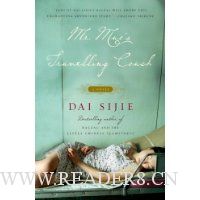基本信息·出版社:Anchor ·页码:304 页 ·出版日期:2006年06月 ·ISBN:1400077141 ·International Standard Book Number:1400077141 ·条形码:97 ...
| 商家名称 |
信用等级 |
购买信息 |
订购本书 |
|
|
 |
Mr. Muo's Travelling Couch |
 |
|
 |
Mr. Muo's Travelling Couch |
 |

基本信息·出版社:Anchor
·页码:304 页
·出版日期:2006年06月
·ISBN:1400077141
·International Standard Book Number:1400077141
·条形码:9781400077144
·EAN:9781400077144
·装帧:平装
·正文语种:英语
内容简介 Having enchanted readers on two continents with
Balzac and the Little Chinese Seamstress, Dai Sijie now produces a rapturous and uproarious collision of East and West, a novel about the dream of love and the love of dreams. Fresh from 11 years in Paris studying Freud, bookish Mr. Muo returns to China to spread the gospel of psychoanalysis. His secret purpose is to free his college sweetheart from prison. To do so he has to get on the good side of the bloodthirsty Judge Di, and to accomplish
that he must provide the judge with a virgin maiden.
This may prove difficult in a China that has embraced western sexual mores along with capitalism–especially since Muo, while indisputably a romantic, is no ladies’ man. Tender, laugh-out-loud funny, and unexpectedly wise,
Mr. Muo’s Travelling Couch introduces a hero as endearingly inept as Inspector Clouseau and as valiant as Don Quixote.
作者简介 Dai Sijie is a Chinese-born filmmaker and novelist who has lived and worked in France since 1984. His first novel,
Balzac and the Little Chinese Seamstress, was an overnight sensation; it spent twenty-three weeks on the
New York Times best-seller list.
编辑推荐 "Fans of Dai Sijie's
Balzac will adore this enchanting adventure story." —
Chicago Tribune“Always entertaining. . . . A bawdy, comic romp [that] takes our hero into all kinds of wild scrapes and adventures.” —
San Francisco Chronicle"Poignant. . . . Hilarious. . . . A fascinating book." —
San Jose Mercury News 文摘 A Disciple of Freud
The metal chain sheathed in transparent pink plastic is reflected, like a gleaming snake, in the window of the railway carriage, beyond which the signals fade to pinpoints of emerald and ruby before being swallowed up in the mist of a sultry night in July.
(Only a short while ago, in the squalid restaurant of a little station near the Yellow Mountain, this same chain had been looped around the leg of a fake-mahogany table and the retractable chrome-plated handle of a pale blue Delsey suitcase on wheels belonging to one Mr. Muo, a Chinese-born apprentice in psychoanalysis recently returned from France.)
For a man so bereft of charm and good looks, thin and scrawny, a scant five foot three, with an unruly shock of hair and bulging eyes slightly squinty behind thick lenses, Mr. Muo moves with surprising assurance: he takes off his French-made shoes, revealing red socks (the left one with a hole, through which pokes a bony toe, pale as skimmed milk), then climbs up on the wooden seat (a sort of banquette deprived of padding) to stow his Delsey on the luggage rack; he attaches the chain by passing the hoop of a small padlock through the links on either end, and rises up on tiptoe to confirm that the lock is secure.
Having settled on the bench, he stashes his shoes under the seat, dons a pair of white flip-flops, wipes his glasses, and, lighting a small cigar, uncaps his pen and gets to work-that is to say, he begins noting down dreams in a school exercise book purchased in France, this discipline being part of his self-imposed training as a psychoanalyst. Hardly has the train gathered speed when the hard-seat carriage (the only one for which tickets were still available) is bustling with peasant women carrying large baskets and bamboo panniers, plying their modest trade between stations, lurching up and down the aisles, some with hard-boiled eggs and sweet dumplings, others with fruit, cigarettes, cans of cola, Chinese mine
……




